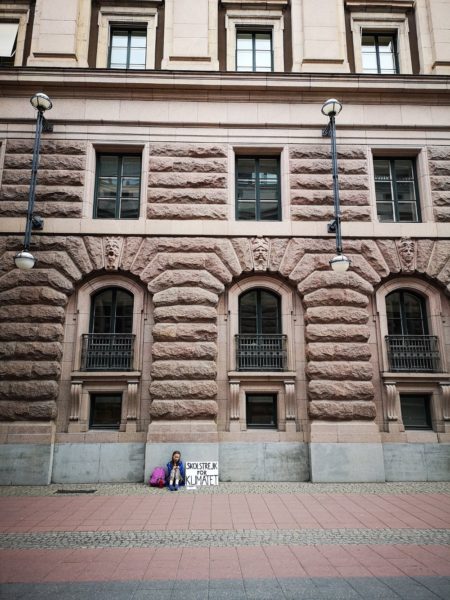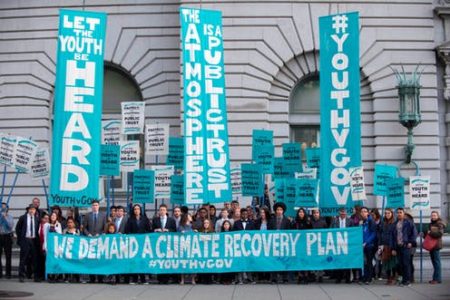July 28, 2019 – Greta Thunberg, the teenage voice of her generation, speaking out about the lack of action by world leaders on climate change, has tried to shame the adults of this world into acting in our own best interest as well as the interest of generations to follow. This 16-year-old has spoken in front of audiences containing government, and economic leaders from across the world. She has used “parrhesiastes,” a Greek term, which means, speaking candidly, and speaking it to those in power, to explain why her generation fears for its future because of the inaction to snails-paced actions by the political and economic establishment in addressing the positive feedbacks in weather and climate that are creating negative consequences for us all.
Words are interesting. Scientists describe the influences of climate-altering change using the term “positive feedback.” Why isn’t it “negative feedback?” Because positive feedback refers to the amplification through cause and effect of an existing trend, for example, rising temperatures from increased concentrations of atmospheric greenhouse gases, or more frequent extreme weather events because a warmer atmosphere becomes more turbulent and less predictable.
On the other hand, a negative feedback is one that diminishes or reverses such trends. Instead of warming, there is cooling. Instead of more extreme weather patterns, we witness more predictable ones based on historical records and patterns.

When Thunberg began her one-day strike in front of the Swedish parliament, she handed out pamphlets to passers-by which stated: “I am doing this because you adults are shitting on my future.”
Strong words coming from what was at the time, a 15-year-old. In recent speeches, she has pulled even fewer punches telling “the grown-ups …the press and the politicians” that they have failed youth and the planet.
OPEC’s Secretary-General, Mohammad Barkindo, recently declared Thunberg and her followers to be “perhaps the greatest threat to our industry going forward.” When speaking to power candidly is seen as a threat, the accuser should be looking in the mirror. A teenager shaming the political world, and business giants to do the right thing, is heroic. But I am not sure if I can take Barkindo’s words seriously. Thunberg can only be a threat if she and those who support her turn policymakers into planet savers. Thunberg can only be a threat to OPEC if governments around the world force oil and gas producers to implement net-zero emissions technologies or shut down operations entirely.
In the last week, two Canadian fossil fuel companies reported aspirational goals to reduce their carbon emissions by a significant percentage. They did this in the process of announcing new carbon intensity number reductions to show they were on the right side of the carbon issue. They neglected to mention that in both cases the company’s increased production had more than offset the benefits of GHG emissions saved through better intensification practices. Calling the announcements misleading is an understatement. Could they also be criminally misleading?
Are the Governments of Brazil and the United States Acting in a Criminal Manner When it Comes to Climate Change?
Could the actions of the current executive branch of the United States which has rolled back climate change initiatives of the previous White House occupant, and done it with relish, be deemed criminal? It is hard to know whether these actions are being driven by oil and natural gas lobbyists in the power corridors of Washington, or by hatred by the current White House occupant, for the man he replaced. Nevertheless, the damage to global climate change action is being done and will take a number of years and trillions of dollars to undo.
The current Brazilian executive branch is doing to the Amazon rain forest, what the U.S. executive branch is doing to climate change policy. Could this be deemed criminal? Brazil’s previous policy for decades had been to protect the Amazon rainforest from deforestation to help mitigate climate change. That is no longer government policy. Environmental regulation of the rainforest in Brazil is over in the name of economic growth. Since January of this year, deforestation rates have dramatically increased by 80%.
Can these two countries and others with similar practices be held criminally liable for contributing to global warming?
Can countries not implementing mitigation efforts be deemed criminally responsible for the climate change impacts on their citizens and others?
Is there a court of last resort to bring violators of the planet’s environment to justice?
Today, there are a few legal bodies at the international level that can serve as the court of last resort when considering climate change litigation. Nations have courts that can address the behaviour of those that put others at risk from ignoring climate change facts if presented. Currently, we are seeing suits being heard in U.S. courts brought by young people who have taken on the federal government for its lack of climate action. A recent judgment in The Netherlands has ruled in favour of youth citizens against the Dutch government for its inaction on climate change and given the government a deadline to comply.
At the international level there are identifiable jurisdictions and bodies that can hear cases and proceedings against climate change violators. In a paper published by the Sydney Law School, Australia, in October of 2009, the author, Tim Stephens, searched for such organizations and identified three types of international proceedings that could be dealt with by a number of jurisdictions He divided case types into three categories: progressive, regressive, and administrative.
Progressive Proceedings
The courts could become involved when governments do not respond promptly to a climate change threat. These types of court cases are defined as progressive proceedings and could be launched against company executives, and legislators deemed to be acting against the common good. As for one government suing another for impacts of climate change, cases around transboundary damage have appeared in courts with varying degrees of success for the plaintiffs.
At the present rate of alpine glacier melt in the Himalayas, one could imagine the governments of Southeast Asia suing India or China, at some future date, for there ineffectiveness in reducing carbon emissions linked to glacial melt that results in positive feedbacks impacting river flows and water supplies. The jurisdictional body to hear such a case would likely be the International Court of Justice (ICJ) whose jurisdiction is accepted by most countries on the planet.
But the case could also be heard in other international forums including the Human Rights Committee established by the United Nations’ International Covenant on Civil and Political Rights, (ICCPR), which under human rights complaints procedures, can bring a party before this body after all local remedies have been exhausted. Rulings by the ICCPR, however, are nonbinding.
Regressive Proceedings
The dispute settlement mechanism of the World Trade Organization (WTO), and tribunals such as the International Tribunal for the Law of the Sea are bodies were one would see regressive proceedings. Both of these bodies are non-environment focused. But provisions adopted by countries related to climate change policy could have impacts that would be subject to the jursidictions of these bodies. Dispute settlements around issuing of carbon credits in an international cap and trade environment is a good example where these bodies might be requested to establish legality. To date, the WTO has been involved with a number of environmental questions of this type.
Administrative Proceedings
The non-binding nature of the Paris Climate Agreement makes it difficult for litigators to find fault with signatories that fail to meet pledges. That is the great weakness of the 2015 agreement’s administrative arm. There appears to be no non-compliance mechanism making enforcement of the agreement impossible.
The limitation to invoke administrative proceeding against the United States and Brazil related to their present intention to be non-compliant with the terms and goals of the Paris Climate Agreement represents a significant limiting factor in calling governments to account for inaction.
Enforcement was part of the Kyoto Protocol, the last international climate change agreement before Paris, but the commitment to Kyoto ran out in 2012. That means if a civil proceeding were to be brought before the ICJ there would be no legal means to enforce compliance. So at present, we cannot call the U.S. executive branch and Brazil’s president to account.









